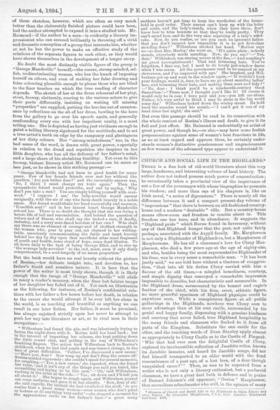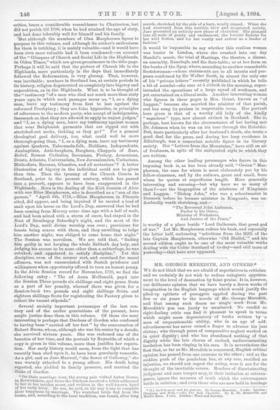CHURCH AND SOCIAL LIFE IN THE HIGHLANDS:*
THERE is a fine look of old-world literature about this very large, handsome, and interesting volume of local history. The author does not indeed possess much power of concentration ; he occasionally takes a provincial view of the importance of not a few of the personages with whose biographies he presents his readers ; and more than one of his chapters is, like as Irish novel, "a series of digressions." There is nearly all the difference between it and a; compact present-day volume of "impressions " that there is between an old-fashioned country- house and a modern "desirable" villa. But a country-house means elbow-room and freedom to ramble about in. This freedom one has here, and in abundance. It suggests the "Highland pride" which Burns found in Inveraray, without any of that Highland hunger that the poet, not quite fairly perhaps, associated with the Argyll family, Mr. Macpherson is not only a Highlander of Highlanders, but a Macpherson of Macphersons. He has all a clansman's love for Cluny Mac- pherson, who died a few years ago at the age of eighty-one, and who, besides being the most representative Highlander of his time, was in every sense a remarkable man. "It has been justly said," we are told here without a tincture of exaggera- tion, "that into all his duties Cluny carried with him a flavour of the old times,—a mingled homeliness, courtesy, and simple dignity that conveyed a, remarkable impression impossible to describe, but characteristic and memorable. In the Highland dress, surmounted by the bonnet and eagle's feather of the chief, with his firm, erect, athletic figure, no more graceful specimen of Highland physique could be anywhere seen. While a conspicuous figure at all public gatherings in the Highlands, nowhere was Cluny seen to more advantage than at his own castle, surrounded by his genial and happy family, dispensing with a genuine kindness and courtesy that never failed, true Highland hospitality to the many friends and clansmen who flocked to it from all parts of the Kingdom. Substitute the one castle for the other, and the touching words of Dean Stanley apply almost as appropriately to Cluny Castle as to the Castle of Fingask. 'Who that had ever seen the delightful Castle of Cluny, explored its inexhaustible collection of Jacobite relics, known its Jacobite inmates, and heard its Jacobite songs, did not feel himself transported to an older world with the fond remembrance of a past age, of a lost love, of a dear though vanquished cause?" Then, as was to be expected from a writer who is not only a literary enthusiast, but a perfervid clansman, we have a great deal both in defence and in praise of Samuel Johnson's old opponent, " Ossian " Macpherson, that marvellous schoolmaster who still, in the opinion of many * Gliinpree of Clairol' and Social Life in the Ifightande in Oldon Times; and Other Popore By Alexander Macpherson, M.A. Scot, London: Blaekvrood and Sono. 103. critics, bears a considerable resemblance to Chatterton, but did not perish till 1798, when he had attained the age of sixty, and had done tolerably well for himself and his family. But although the members of Olan Macpherson figure to purpose in this volume, and although its author's enthusiasm for them is catching, it is mainly valuable—and it would have been even more valuable had it been condensed—on account of the "Glimpses of Church and Social Life in the Highlands, in Olden Times," which are given prominence in the title-page.
Perhaps it will be said that the picture of Church life in the Highlands, more particularly in the days that immediately followed the Reformation, is very gloomy. That, however, was inevitable ; nowhere in Scotland has, at certain periods in its history, religion degenerated so completely into bigotry and superstition, as in the Highlands. What is to be thought of the" testimony "of a man who died not much more than sixty years ago, in which such passages occur as, "I, as a dying man, leave my testimony from first to last against the reformed Presbytery ; they are false hypocrites, in principles of adherance to the modern party, who accept of indulgencies, inasmuch as that they are allowed to apply to unjust judges," and "I, as a dying man, leave my testimony against women that wear Babylonish garments that are rigged out with stretched-out necks, tinkling as they go P" For a general theological gaol delivery, too, what could well be more thorough-going than, "1, as a dying man, leave my testimony against Quakers, Tabernacle-folk, Haldians, Independents, Anabaptists, Anti-burghers, Burghers, Ohappels of Ease, Relief, Roman Catholics, Socenians, Prelacy, Armenians, Deists, Atheists, Universalists, New Jerusalemites, Unitarians, Methodists, Bareans, Glassites, and all sectarians"? A better illustration of bigotry in the individual could not be given than this. Then the tyranny of the Church Courts in Scotland, prior to the present century, which has passed into a proverb, appears to have been exaggerated in the Highlands. Here is the dealing of the Kirk Session of Alvie with one Elias Macpherson, who is described as a "son of the parson." "April 6th, 1718,—Elias Macpherson in Pitourie cited, did appear, and being inquired if he carried a load of malt upon his horse on the Lord's Day, answered that he had been coming from Murray some time ago with a boll of malt, and had been seized with a storm of snow, had stayed in the Nest of Strathspey Saturday's night, and the most of the Lord's Day, until divine worship was over ; provisions for beasts being scarce with them, and they unwilling to lodge him another night, was obliged to come home that night." The Session was merciless. We are told that, "finding him guilty in not keeping the whole Sabbath day holy, and judging his excuse to be none other than a subterfuge, he was rebuked, and appointed to satisfy discipline." Yet this discipline, even of the severer sort, and exercised for moral offences, was not unassociated with Scotch prudence and willingness when opportunity offered to turn an honest penny. In the Alvie Session record for November, 1720, we find the following entry : "The kid Anna McDonald, payd into the Session Three pounds six shillings and eight pence Scots as a part of her penalty, whereof there was given for a Session-book two pounds and eight shillings Scots, and eighteen shillings Scots for registrating the Factory given to collect the vacant stipends."
Several socially important personages of the last cen- tury and of the earlier generations of the present, have ample justice done them in this volume. Of these the most interesting is perhaps that Duchess of Gordon who confessed to having been "carried off her feet" by the conversation of Robert Burns, whom, although she was his senior by a decade, she survived sixteen years. She was reckoned one of the beauties of her time, and the portrait by Reynolds, of which a copy is given in this volume, more than justifies her reputa- tion. Her early history would seem, from the light that has recently been shed upon it, to have been genuinely romantic.
As a girl, and as Jane Maxwell, "the flower of Galloway," she was warmly attached to a young officer. His death being reported, she yielded to family pressure, and married the Duke of Gordon.
"On their marriage tour, the young pair visited Ayton House, In Berwickshire, and there the Duchess received a letter addressed to her in her maiden name, and written in the well-known hand of her early lover. He was, he said, on his way home to complete their happiness by marriage. The wretched bride fled, from the house, and, according to the local tradition, was found, after long
search, stretched by the side of a barn, nearly crazed. When she had recovered from this terrible blow and re-entered society, Jane presented an entirely new phase of character. She plunged into all sorts of gaiety and excitement, she became famous for her wild frolics, and for her vanity and ardour as a leader of fashion."
It would be impossible to say whether this restless woman was busier in London, where she crushed into one day Handers music, the trial of Hastings, the theatre, a dinner, an assembly, Ranelagh, and the faro-table ; or at her farm on the banks of the Spey, where, according to another remarkable Scotehwoman—whose statements are to all intents and pur.
poses confirmed by Sir Walter Scott, in almost the only one of his "private letters" recently published in which he tells a bit of scandal—she rose at 5 o'clock in the morning, super- intended the operations of a large squad of workmen, and yet entertained on a liberal scale. Another interesting woman who figures in these pages is Mrs. Grant, known as "of Laggan," because she married the minister of that parish, and has sung its praises in respectable verse. Her portrait here given is that of a worthy old lady of the kindly " sagacious " type, now almost extinct in Scotland. She is, perhaps, best known for the circumstance of her having met Dr. Johnson when he was on his tour through the Hebrides. But, more particularly after her husband's death, she wrote a good deal for the press, and during her long residence in Edinburgh, was a somewhat notable figure in its literary society. Her "Letters from the Mountains," have still an air of freshness, in spite of the antiquated style in which they are written.
Among the other leading personages who figure in this imposing book is, as has been already said, " Onion " Mac- pherson, the case for whom is most elaborately put by his fellow-clansman, and by the authors, great and small, from whom he quotes at superfluous length. More generally interesting and amusing—but why have we so many of them P—are the biographies of the ministers of Kingussie and Laggan. "Bishop John," who was a schoolmaster in Dornoch before he became minister in Kingussie, was un- doubtedly worth sketching, and— "The Reverend John Anderson, Factor to his Grace,
Minister of Fochabors, And Justice of the Peace,"
is worthy of a place beside "Lord Dalhousie, that great god of war." Let Mr. Macpherson reduce his book, and especially the latter half, embracing "selections from the MSS. of the late Captain Macpherson, otherwise Old Biallid,' " and his second edition ought to be one of the most valuable works dealing with the Celtic Scotland of to-day--and still more of yesterday—that have ever appeared.



































 Previous page
Previous page